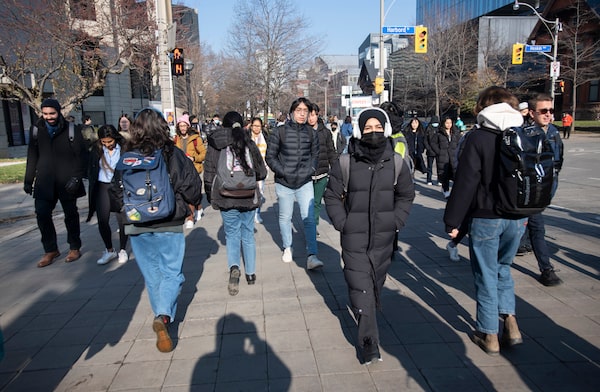
Students walking on St. George St. near the University of Toronto, on Nov 23, 2022. Immigration Minister Marc Miller said in a CTV interview Sunday that the federal government is considering a limit on the number of study permits it issues.Fred Lum/The Globe and Mail
Canadian postsecondary schools are warning that a federal cap on international student visas could have unintended consequences that will hurt institutions under financial strain and risk damaging the country’s image as a study destination.
Immigration Minister Marc Miller said in a CTV interview Sunday that the federal government is considering a limit on the number of study permits it issues, citing a high volume that “has gotten out of control.” It’s the second time since August that he has suggested such a move is in the works, though Ottawa has yet to produce details.
But Philip Landon, interim president of Universities Canada, the lobby group that represents nearly 100 Canadian schools, said Thursday that he had cautioned the government about adopting a one-size-fits-all approach to a visa cap.
There were more than 800,000 international students in Canada in 2022, and the government has said previously it expected more than 900,000 in 2023. The study-permit program has come under scrutiny because the addition of international students has contributed to a housing crisis in some parts of the country, such as the Greater Toronto Area. Mr. Miller has also compared some institutions to “puppy mills” that are providing a subpar educational experience.
Mr. Landon said his sense is that the federal government is more focused on private colleges than universities this time and is trying to devise mechanisms to address growth in that sector. He said that, although universities have seen significant increases in international student numbers, that growth has been steady rather than explosive.
“Canada needs to continue to attract talent from from around the world. It’s really important that there’s responsible growth and that we don’t put a chill on international students coming,” Mr. Landon said.
Universities are still hoping to see a trusted institutions framework implemented, which would reward schools with a good record on international students and fast-track their study-permit applications. The government previously said it would have such a framework prepared for the fall 2024 semester.
Bahoz Dara Aziz, a spokesperson for Mr. Miller, said negotiations on that model are continuing with provincial governments.
Immigration Minister urged to crack down on international student ‘no shows’ at colleges
Colleges and Institutes Canada, the umbrella group that represents publicly-funded colleges, said growth in international student numbers has brought many benefits to schools and communities, including a $22-billion annual contribution to the economy. The higher tuition fees paid by international students have helped schools mitigate the impact of decreased provincial funding, CIC said.
“Solutions need to recognize regional differences and steer clear of a one-size-fits-all approach, which could be detrimental to those communities that have ample capacity to welcome additional students,” CIC said in a statement on its website.
Michael Sangster, chief executive officer of the National Association of Career Colleges, said he does not believe that private institutions, such as his constituents, are the problem.
“We welcome the minister’s clear indication that he’s looking at labour force needs as an important outcome for international student recruitment,” Mr. Sangster said. “Skilled trades, personal support workers, truck drivers, logistics, those are the kind of roles our institutions flourish at.”
Larissa Bezo, president of the Canadian Bureau for International Education, said Ottawa must avoid what she called “simplistic, short-term solutions” that would damage Canada’s reputation as a welcoming, attractive country to international students.
She conceded there is over-saturation of students in some parts of the country, but pointed to regions with capacity to grow that are eager for more. She said a cap could lead to unhealthy competition between provinces and institutions.
“Instead of a positive narrative focused on how Canada can best manage its success in becoming a destination of choice for the best and brightest international students, we have a negative one that seems to be blaming them for failures of process and policy. This is short-sighted and unconscionable.”
 Joe Friesen
Joe Friesen